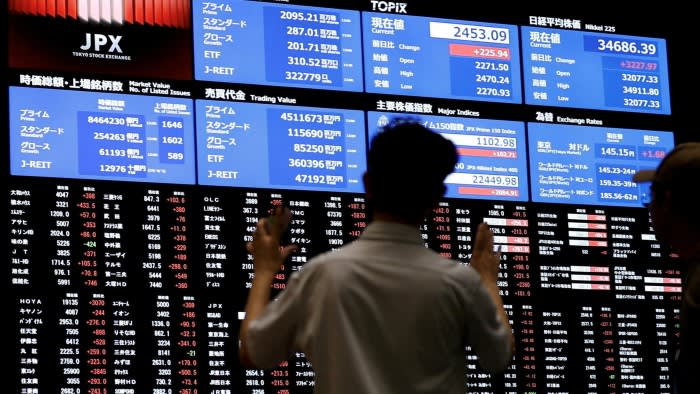Stay informed with free updates
Simply sign up for myFT Digest of Exchange Traded Funds, delivered straight to your inbox.
The approval of spot crypto exchange-traded funds in the US, Hong Kong and other markets has highlighted the contrasting and conservative approach taken by Japanese regulators.
Japan has long billed itself as a digital asset-friendly country as part of its broader ambitions to become a larger wealth management hub. However, at the policy level, there has been a reluctance to boldly lift the tax and regulatory restrictions necessary for widespread use.
According to Oki Shiozawa, investment director at Sumitomo Mitsui Trust Asset Management, it is widely known that Japan’s Ministry of Finance is skeptical of cryptocurrencies in general.
“I can’t think of a good way to convince the authorities at this point,” he said.
This article was previously published by Ignites Asia, a title owned by FT Group.
“I’m not saying that crypto-related ETFs are impossible,” Shiozawa added. “However, Japan’s Financial Services Agency, which approves financial products, is fundamentally conservative.”
After months of debate, the U.S. Securities and Exchange Commission granted approval for the first spot Bitcoin ETF in January. Approval for a spot ETF to hold Ether, the second largest cryptocurrency, was granted in July.
In April, Hong Kong’s financial authorities granted approval for Bitcoin and Ethereum-backed ETFs. Australia followed suit in May, with other Asia-Pacific markets gearing up to develop their domestic digital asset industries.
Against this backdrop, domestic digital asset advocacy groups have begun calling on authorities to approve the launch of crypto-backed ETFs in Japan.
At the heart of these voices is the significant tax benefits offered by crypto ETFs.
Profits from general cryptocurrency investments are treated as miscellaneous income in Japan and are therefore subject to a maximum tax rate of 55%. On the other hand, ETFs that can be traded on the stock market are treated as capital gains.
This gives ETFs a lower tax rate of around 20 percent, making them a more attractive proposition for investors looking to diversify their portfolios through digital assets. Spot crypto ETFs will also come with tax benefits such as loss carryover.
However, Keisuke Kimura, vice chairman of the Japan Cryptocurrency Business Association and former SMBC Nikko Securities financial advisor, says a number of changes are needed for regulators to act to implement these potential benefits.
“The current situation in Japan is mainly due to regulatory constraints. Our law currently does not allow the inclusion of crypto assets in investment trusts, including ETFs,” Kimura said.
“To change this, there needs to be wider acceptance in society that crypto assets can actively contribute to the wealth building of Japanese people,” he added.
The situation is further complicated by major crypto scandals in Japan, including MTGox and DMM, which have resulted in hundreds of millions of dollars worth of Bitcoin losses.
“Family offices and corporate venture capital firms with agile decision-making processes may be ready to move forward, but many traditional large asset managers, insurance companies and financial institutions still remain focused on crypto assets and risk-taking. “We’re still getting a better understanding of the management protocols,” he said. .
Some large traditional asset managers are already preparing to launch crypto ETFs in Japan as soon as regulators give the green light.
Franklin Templeton and Japanese financial services group SBI Holdings announced in July that they would partner to form a new digital asset joint venture to develop new products such as crypto ETFs.
SBI Holdings has already partnered with UK-based Man Group and US private equity firm KKR on similar initiatives. Nomura has also established a digital assets subsidiary.
Many in the digital asset space interpreted SBI’s partnership with Franklin Templeton as a sign that regulatory change could be coming to Japan.
However, while the Financial Services Agency has indicated that it will discuss crypto regulation throughout this year, it has given no indication that major changes to the digital asset industry are imminent, including approval of spot crypto ETFs.
*Ignites Asia is a news service for professionals in the asset management industry published by FT Specialists. Trials and subscriptions are available at ignitesasia.com.


